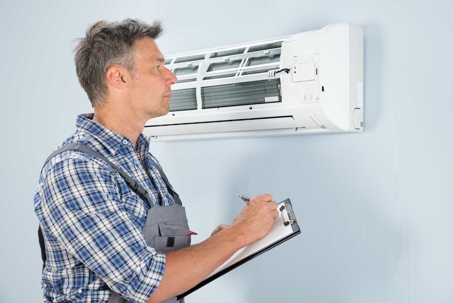What to Expect from a Spring HVAC Inspection
Spring is almost here and that means itandrsquo;s time to think about your HVAC system. As you switch out of heating mode and into cooling mode, itandrsquo;s pertinent to think about how your equipment will react, given that your AC unit may have been dormant for several months. Fortunately, with an HVAC inspection from Valley Heating, Cooling, Electrical and Solar, youandrsquo;ll be able to ensure that your system is in great condition and ready to keep you comfortable for the whole season. Keep reading to learn what to expect from a spring HVAC inspection, and remember that you can count on our heating and air conditioning pros year-round for all your home comfort needs.
10 Things You Get When You Schedule a Spring HVAC Inspection
- Cleaning Indoor Unit: If your AC unit collected a lot of dust and debris in the winter, it is an extremely good idea to get it cleaned before you need to start using it. At Valley Heating, Cooling. Electrical and Solar, our technicians will thoroughly wipe down AC components such as blower fans and coils, so your system does not end up recirculating contaminants that could affect your indoor air quality when you fire it up again.
- Cleaning Outdoor Unit: Just as you need to clean your indoor unit for optimum HVAC functioning, you should also clean your outdoor condenser when spring comes. This is true with every season, but especially winter, when leaves, twigs, grass, dirt and other debris that may have accumulated in or on your unit over the course of the season. In a worst-case scenario, you can even find that an animal has taken up residence and made a nest inside your condenser unit, so getting a professional to clean it for you is always a good call.
- Register and Vent Cleaning: Once your HVAC systemandrsquo;s indoor and outdoor units have been cleaned, we will inspect your registers and vents. Again, these areas often end up accumulating dust and dirt over the season, so it is important to clean them to maintain good indoor air quality. Too often, people go years without having their vents and registers cleaned, so if you have never had this done, we suggest calling Valley Heating, Cooling, Electrical and Solar for an HVAC maintenance check before you start using your system.
- Clearing Drainage Line, Hole and Pan: Most air conditioners have a drainage hole at the base of the unit. It is important to inspect it and flush it out so there is no obstruction in the condensate line. If your system does not have a traditional drainage hole, it probably has a drain pan, which should also be checked and emptied periodically.
- Parts Lubrication: Your AC unit relies on many different parts to function. As your system ages, it becomes more important to check these parts and lubricate them so that everything runs smoothly. During a spring HVAC inspection, our technicians can provide necessary lubrication to make sure your system works safely and efficiently so that it will not be in jeopardy of shutting down due to natural wear and tear.
- HVAC Filter Replacement: Replacing your HVAC filter is something you should ideally do at the beginning of every season - and potentially even more during the summer when AC usage is usually at its peak. In a spring HVAC inspection, our technicians will check to see if your filter is in good condition or is clogged with dust and other allergens. A clogged filter will end up increasing your energy costs, as it forces your system to work harder to cool your whole house. Thatandrsquo;s why making sure your filter is clean is extremely important.
- Thermostat Testing: A working thermostat is essential for maintaining ideal comfort levels in your home. During your HVAC inspection, we will test the thermostat to see if it is calibrated correctly to ensure that your home has the right cooling levels moving into spring and summer.
- Refrigerant Level Check: No air conditioning system can function properly without refrigerant. While you should not have to replace your refrigerant if everything is working as it should, sometimes a leak can occur. In that case, our technician will perform a replacement. Our experts at Valley can easily check your refrigerant levels, guaranteeing there is not a leak in your system and that you will get the right amount of cold air as the weather starts to heat up.
- Ductwork Inspection: As mentioned, dust and debris can have a big impact on the ability of your HVAC registers and vents to provide you with the right amount of cool (or hot) air. The same is true of your air ducts, except that your duct system is even more crucial to your comfortandmdash;and tends to be even less inspected. Damage or tearing in your ductwork can interfere with your systemandrsquo;s performance and cost you a ton in unnecessary energy costs. If you have not had your ducts inspected before, it is highly advisable to have them looked at during your spring HVAC inspection.
- Recommendations for Further Service: Perhaps the most important part of a spring HVAC inspection is not only making sure your system is not currently experiencing any problems, but finding ways to help your equipment avoid problems in the future. For instance, if your AC unit still runs on R-22, also known as Freon, it might be time to change to a more sustainable option. And if there is a persistent leak in your air conditioner, that will eventually force you to replace the entire unit. We may even find an issue with your heater while getting your cooling system ready for spring. Whatever the situationis, you can count on our technicians to stay on top of it, providing you with reliable solutions and affordable options to help you maintain premium comfort in your house at any time of year.

